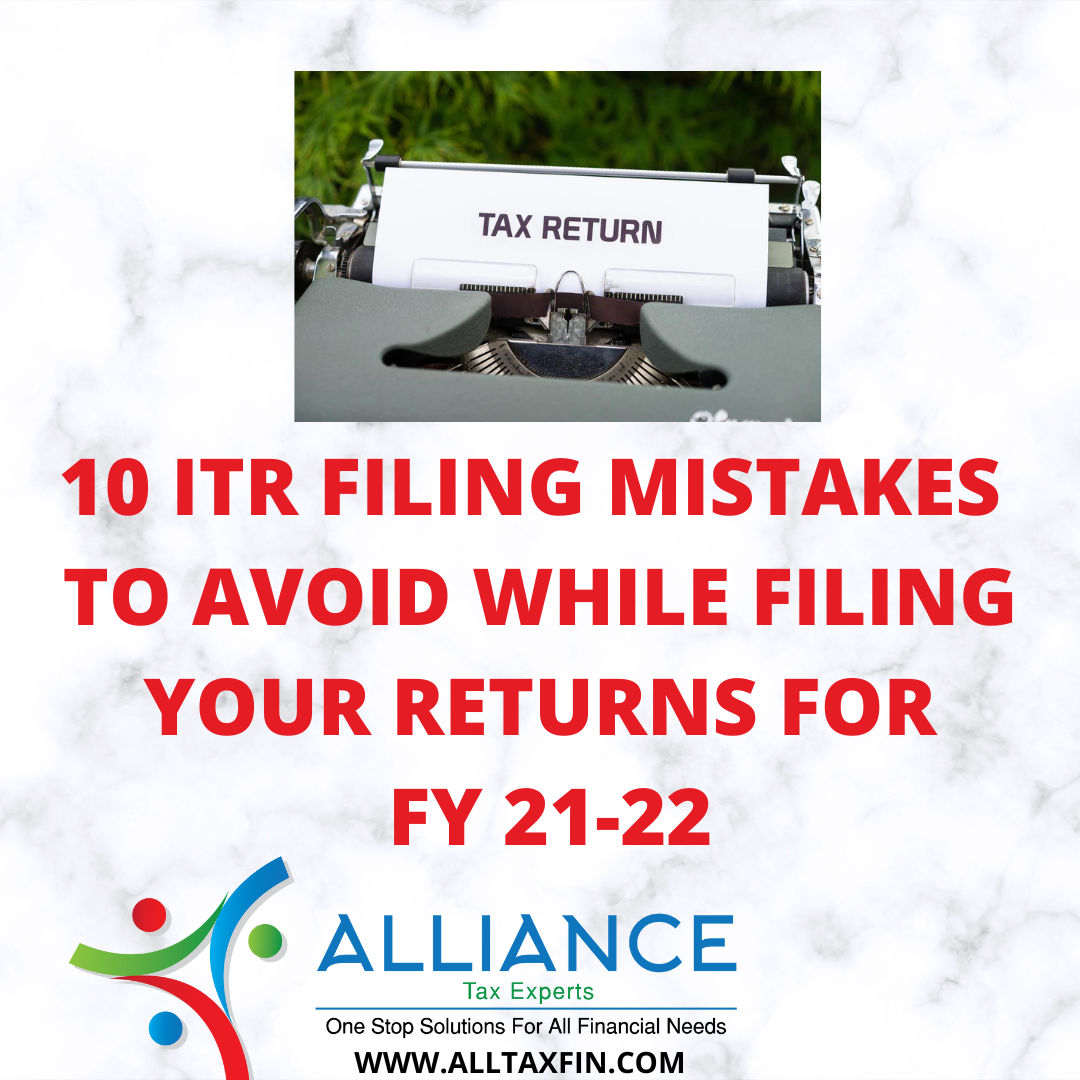
14 Jul
10 ITR FILING MISTAKES TO AVOID WHILE FILING YOUR RETURNS FOR FY 21-22
10 ITR FILING MISTAKES TO AVOID WHILE FILING YOUR RETURNS FOR
FY21-22
This is the part of the
year when taxpayers prepare to file Income Tax Return (ITR) till 31st July
2022. Disclosure requirements and data requirements in tax returns have
increased manifold over the years. While the government's tax portal provides
significant support to taxpayers in selecting the appropriate forms and various
inputs, the primary responsibility for filing a correct and complete tax return
lies solely with the taxpayers.
Here are some critical
points that are relevant to ensuring proper return filing.
1. ITR Form: First
things first. Choosing the right form to file the return is the starting point
of the return filing exercise. Residential status, nature of income, audit
requirements etc. are considered in the selection of the form. For example, a
non-resident should file a tax return using ITR 2 irrespective of the amount of
income, rental income from 2-house property or capital gains. should be
reported in ITR 2 and not in ITR 1 and similarly, income from intraday trading
or futures and options trading should be reported in ITR 3.
2. Personal Information and Bank
Account Details: ITR filing for FY 2021-22 is based on a
pre-populated JSON utility through which personal information details are
automatically retrieved from the tax portal on the ITR form. The taxpayer must
provide his/her correct address, contact number, email-id etc. in their tax
portal. It may be noted that incorrect details, for example, bank account
details, will stall the refund credit process.
3. Reconciliation of Form 26AS and
Form AIS with details available to the taxpayer: To
increase transparency in filling in accurate details of income, the government
has introduced the Annual Information Statement (AIS). Taxpayers should file
their tax returns as per Form AIS and Form 26AS and in case of any deviation,
taxpayers can submit feedback on Form AIS to avoid any inquiry from the tax
department.
4. Non-reporting of assets or
liabilities, foreign assets, directorship or unlisted shareholding: Taxpayers
should report – (i) assets and liabilities (income exceeding INR 5 million),
(ii) assets abroad (generally for resident taxpayers) or (iii) ) directorship
details or (iv) unlisted shareholding where applicable. Non-declaration of
foreign assets can lead to questioning by authorities under both the Income Tax
Act and the Black Money Act.
5. Details of TDS and TCS: Taxpayers
should be careful while claiming correct tax deducted at source (TDS) or tax
collected at source (TCS) while filing ITR as incorrect details may lead to a mismatch
of tax credit and resulting levy. Demand for taxes. Further, where TDS is
required to be carried forward to future years, appropriate references should
be provided in the tax return.
6. Filing of Form 67 for Foreign Tax
Credit Claim: Taxpayers claiming foreign tax credit against
overseas income tax in India are required to file Form 67 before filing ITR.
Apart from filing Form 67, taxpayers must submit proof of tax paid abroad e.g.
Copy of foreign tax return, tax payment challan etc. Taxpayers may be denied
Foreign Tax Credit if Form 67 is not filed.
7. Incorrect bank account details for a
refund: Taxpayers with refund claims should provide correct
bank account details along with bank account verification. Any omission by
taxpayers may result in a delay in receipt of a tax refund.
8. Non-reporting exemption income: Many
taxpayers do not report exemption income (such as interest income from PPF,
interest on Sukanya Samriddhi account, exempt income under tax treaties and
gifts from relatives) while filing ITR. Failure to report exempt income may
lead to questions from tax authorities and denial of exempt status.
9. Non-filing of ITR: Government
has recently notified new categories for filing ITR like – Foreign travel
expenses above INR 0.2 million, Electricity expenses above INR 0.1 million,
Foreign assets, Bank deposits above INR. 5 million, TDS or TCS above INR 25,000
etc., are compulsorily required to file their ITR during the year.
10. Verification of ITR-V: The ITR filing process does not end with the ITR
filing process as taxpayers are expected to either electronically verify the
ITR using OTP or EVC options or manually send the signed ITR-V to the
Centralized Processing Center (CPC). ). Failure to verify ITR-V is tantamount
to non-filing of ITR and may result in denial of loss carry forward or refund
of taxes claimed.
Investing a little time in
filing tax returns correctly can save future time and effort in fending off any
inquiries from the tax authorities. Taxpayers can always consult the Tax Help
Desk of the Government of India and seek professional support wherever required
and complete return filing.
By
Santosh Patil
Director
Alliance Tax Experts Pvt Ltd
9769201316
#incometax #incometaxindia
#incometaxes #incometaxreturn #incometaxrefund #incometaxreturnfiling
#incometaxupdate #incometaxdepartment #incometaxreturns #incometaxballers
#incometaxupdates #incometaxact #incometaxfiling #incometaxpreparation
#incometaxtime #alliancetaxexperts #taxconsultant #nearme